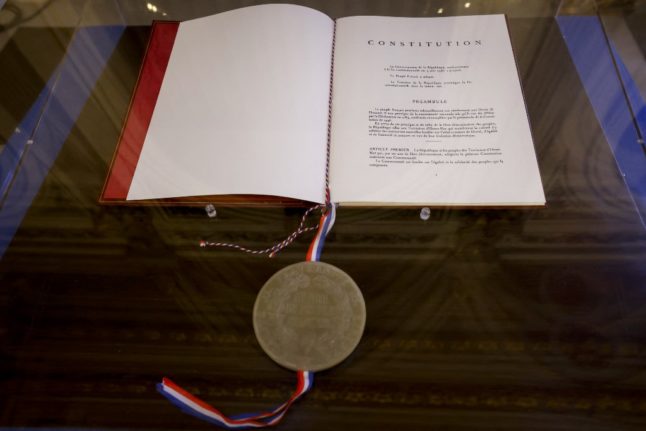The Constitution of France today is very different from the Constitution as it was originally written by the children of the revolution in 1791. It has been amended, rewritten, and changed – and much-loved parts of it weren’t always considered as important as they are today.
Here are a few things about the French constitution that you might not know
Numbers game
Even talk of ‘the’ constitution is misleading, since France has had 15 of them since the first one and the current one, which was adopted in 1958 – the birth of the Fifth Republic (hence that 65th birthday we mentioned).
And even the latest constitution isn’t as originally written. It has undergone 24 revisions since then, affecting some two-thirds of the text.
Since 2005, it has included 10 articles relating to the environment – and there’s even been talk of resetting into a Sixth Republic, with a new constitution (although few people can agree on what that would look like).
What did the first one say?
The main features of the French constitution of 1791 were the abolition of the feudal system and limits on the powers of the king, turning France into a constitutional monarchy (although not abolishing the monarchy, that came later).
Nobles and clergy were stripped of their privileges.
But, over the centuries, things have changed – and the constitution of France has changed with it.
Three little words
They’re everywhere today, and it’s easy to imagine that Liberté, Egalité, Fraternité would be front and centre of every version of the constitution. You’d be wrong.
Revolutionary leader Maximilien Robespierre advocated that the words “The French People” and “Liberty, Equality, Fraternity” be written on uniforms and flags in a speech in December 1790, but his proposal was rejected.
The motto fell into disuse during First French Empire, reappeared in the Constitution of 1848, was discarded again in the Second Empire, and re-established itself under the Third Republic (1870 – 1940). It started appearing on buildings during that period, and also made its way into the post-war constitutions of 1946 and 1958.
1958 and all that
France’s Fifth Republic was established on October 4th 1958 by Charles de Gaulle. But the Constitution that underpins it was written by Michel Debré, the first Prime Minister of the new era.
He is considered the “father” of the current Constitution of France, and served under de Gaulle from 1959 to 1962.
What’s in it
The current constitution provides for the election of the President and the Parliament, the selection of the Government, the powers of each and the relations between them. It ensures judicial authority.
The current Constitution regards the separation of church and state, democracy, social welfare, and the indivisibility of France as core principles of the state.
For many, its most striking feature is the wide-ranging powers that it gives to the president, at the expense of parliament. The Constitutional Article 49.3 – which allows the government to force through limited numbers of bills without having a parliamentary vote – has become the centre of heated political debate and even street battle sin recent months, as the Macron government used it to force through its highly controversial pension reform.
Enshrining rights and responsibilities in the constitution is considered stronger than mere laws, as it’s much harder for subsequent governments to overturn a constitutional change.
President Emmanuel Macron has said that he will put the right to abortion in the French constitution in ‘the coming months’ – a move strongly supported by a majority of French people.
Ch-ch-ch-ch-changes
Changing the constitution in France requires Presidential approval, plus the approval of both houses of parliament (the Assemblée nationale and the Senate) and then the approval of the final text by a three-fifths majority in both parliaments.
Alternatively, it can be changed by referendum, but only after the two assemblies have voted in favour by a simple majority.
Age
The Fifth Republic – and its constitution – will become the longest-lived era of French politics if it survives until 2028. Earlier this year, its 65th anniversary was marked – if it makes 71, it will pass the Third Republic’s longevity record.




 Please whitelist us to continue reading.
Please whitelist us to continue reading.
Member comments